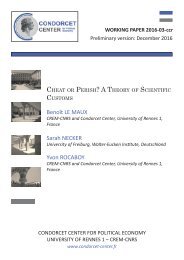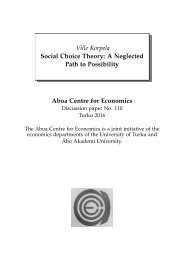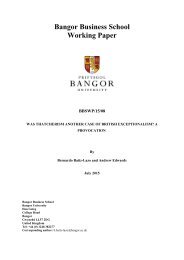MEMORANDUM
n?u=RePEc:hhs:osloec:2016_018&r=hpe
n?u=RePEc:hhs:osloec:2016_018&r=hpe
Create successful ePaper yourself
Turn your PDF publications into a flip-book with our unique Google optimized e-Paper software.
Another Schumpeter initiative soon after arrival at Harvard and much appreciated by<br />
Leontief was an informal group which dined once a month and called themselves “The<br />
Seven Wise Men.” In addition to Schumpeter and Leontief the members of the original<br />
group were Edward Mason, Edward Chamberlain, Overton Hume Taylor, Seymour Harris,<br />
and Douglas Brown. It was Leontief’s idea to make a joint effort to compile funds to<br />
establish a wine cellar. The group wrote an “anti-New Deal” book, published in 1934;<br />
Leontief’s contribution was a chapter in agricultural economics.<br />
The Harvard Committee on Research in the Social Sciences<br />
Harvard had a Committee on Research in the Social Sciences. Harvard faculty in the<br />
social sciences could apply for grants for research assistance, primarily for conducting<br />
empirical investigations. Not many at Harvard Faculty exploited the opportunity, perhaps<br />
not more than five or six each year and often the same persons in successive years. During<br />
Leontief’s third visit to Harvard in March 1932 he was told about the Committee, and as he<br />
would be Harvard faculty from the forthcoming academic year, he was invited to apply.<br />
The secretary of the Committee was Elizabeth Waterman Gilboy whom Leontief knew<br />
from his last years in Germany as a critical, but positively inclined, reviewer of his work on<br />
demand and supply analysis. He would be in frequent touch with her as secretary of the<br />
Committee for the next ten years, as he applied for and received grants from the Committee.<br />
Gilboy went out of her way to smooth out problems that arose in this process. 205<br />
The Committee practiced a simple system for doling out grants for research assistance<br />
to social science faculty. Application for grants from the Harvard Committee had to be<br />
submitted by February for the forthcoming academic year. Applications were submitted on<br />
a two-page form with of a small number of entries; no further project documentation was<br />
normally required. It was a semi-formal procedure. A brief report on the outcome of the<br />
project was expected at the end of the academic year.<br />
The key entries on the form were the name of the project (usually given as descriptive<br />
phrase) and an outline of what it was about. Other entries on the form were about the kind<br />
and cost of assistance required, data needs, publication plans, etc.<br />
The applications and reports submitted by Leontief to the Harvard Committee make up<br />
an interesting source about his research in the 1930s. The early applications were<br />
formulated within the paradigm he had developed in Germany. But at some points the<br />
input-output paradigm emerged out of this process. There are limitations as to what can be<br />
read out of the applications as the information is brief. Applications might have been<br />
discussed informally with the Committee being recorded.<br />
205 Gilboy later became the administrative director of Leontief’s Harvard Economic Research<br />
Project (HERP) from 1948.<br />
87





